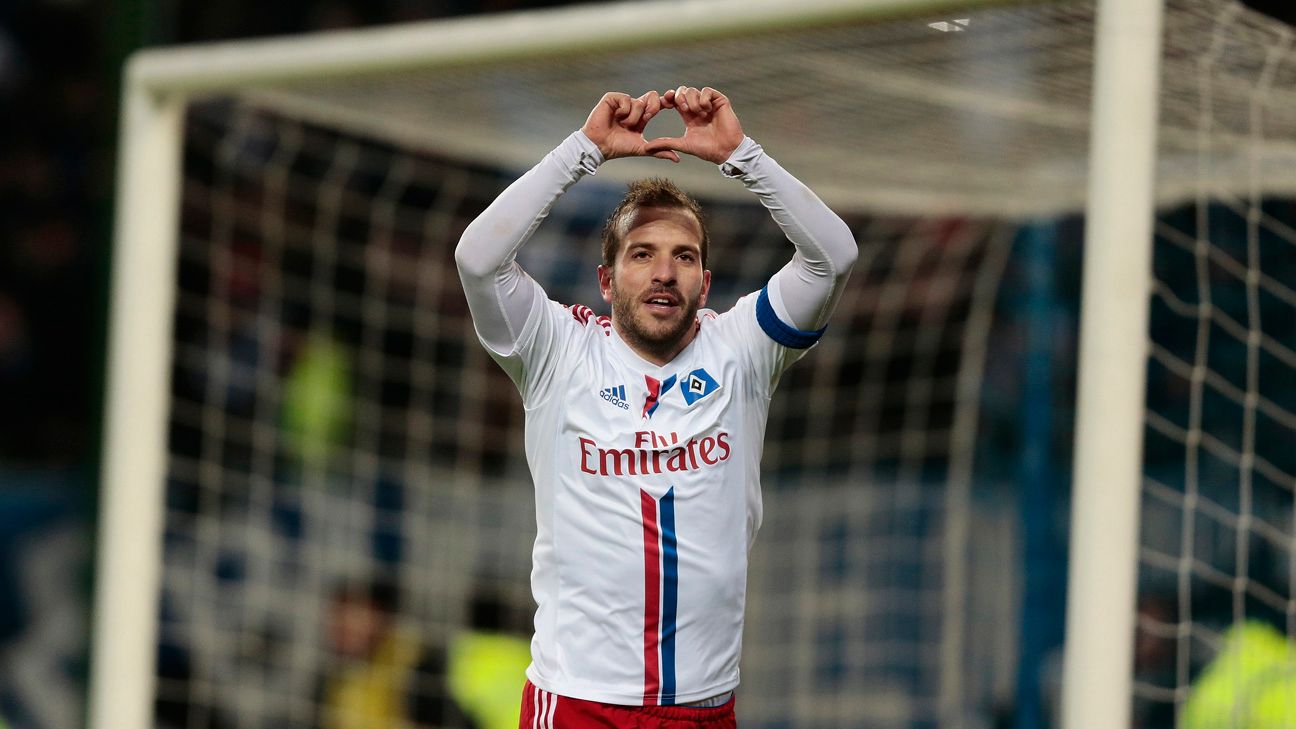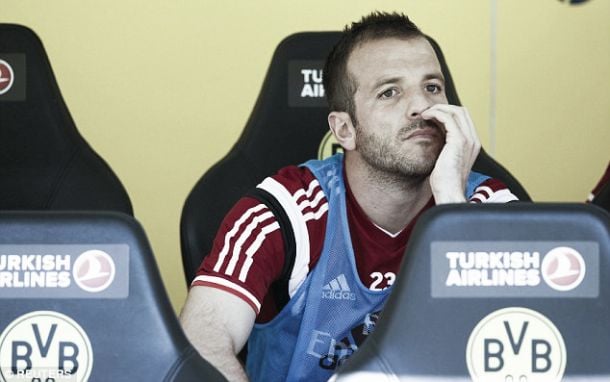Today, Real Betis have announced that Rafael van der Vaart, aged just 32, has signed a two-year deal with the club, making the switch from Hamburger SV on a free transfer and boldly emphasising his fall from grace.
Just seven years ago, van der Vaart was nominated for the 2008 Ballon d'Or, making the final list of 30 players after an outstanding year with Hamburg that earned him an irresistible move to Real Madrid. Alongside him were the likes of Xavi, Steven Gerrard, Frank Lampard, Michael Ballack and Cesc Fabregas - van der Vaart was classed as one of the best midfielders in the world and rightly so.
Van der Vaart was clearly talented. He was a marvellous footballer with skill and confidence in abundance. His distribution of the ball was wonderfully accurate, and very effective when coupled with his terrific vision, whilst his ability to strike the ball was second-to-none. From open play or dead balls, van der Vaart knew how to find the back of the net in style, and he was composed enough to net under pressure from inside the area too.
He excelled with Ajax once he broke through from their academy, and was a prolific goal-scorer from his advanced midfield position, scoring 63 goals in 156 appearances before, following some issues with his behaviour and attitude at Ajax, which led to him being stripped of his captaincy, he announced he was leaving the club at the end of the 2004/05 season.
Move to Hamburg
At 22-years-old, him and his limitless potential had the world at their feet as interest swept in from the biggest clubs in Europe, including AC Milan and Manchester United. However, van der Vaart, quite remarkably, chose to sign for German side Hamburger SV, sparking the famous quote from Ajax legend Johann Cruyff, "I don't know what to say about it or what Rafael van der Vaart is doing in Hamburg."
However, it would prove to be a match made in heaven. In his first season in Germany, the midfielder finished as Hamburg's top-scorer with 16 goals, helped them win the 2005 Intertoto Cup and was a key player in their third-placed finish - the highest they had finished in the Bundesliga for six years. His marvellous influence on the team saw him named captain for the following season, though it was a campaign plagued by injuries for the Dutchman.
His third and final season saw him return to full fitness and help his team improve on their seventh-placed finish in 2007, guiding them to fourth and again playing a key role as they won the Intertoto Cup once more before bidding farewell in favour of a move to Spain to play for Real Madrid. Van der Vaart left having scored 48 goals in 112 games for the club, helping them get back up towards the top of the Bundesliga and earning his Ballon d'Or nomination in the process.
Real secured the Dutchman's services for a fee of €13 million in the summer of 2008. He signed a five-year contract and got off to a good start with a goal against CD Numancia on his league debut, but the dream move would soon become a disappointing reality as Juande Ramos used him largely as an impact sub and, the following season, he was told by new coach Manuel Pellegrini that he was not a part of his plans.
The huge move had not paid off and the decline of Rafael van der Vaart had begun.
Leaving Real Madrid
After a season in which he struggled for opportunities, Van der Vaart left Real for Tottenham Hotspur on the deadline day of 2010's summer transfer window for a fee of £8 million. Nonetheless, his first season at White Hart Lane was a success. He scored 13 goals and provided nine assists, the most of any Spurs' player in either category, in his first year in England, helping the London club qualify for the Europa League in the process.
His second season was similarly proflific and he even equalled a club record by scoring in five consecutive Premier League matches as White Hart Lane looked set to become his new long-term home.
Nevertheless, the arrivals of Mousa Dembele, Clint Dempsey and Gylfi Sigurdsson threatened to reduce the Dutchman's game time and thus, despite already playing twice for Spurs in the 2012-13 season, he departed at the end of August and returned to Hamburg in a move that was predicted to help revitalise his declining career.
His unwillingness to fight for a place in the team, almost expecting to being gifted a starting berth unconditionally, was a unfortunate to see and a big factor in why he struggled to settle down at a club in the important years of his career.
Since leaving Ajax, he has failed to secure a move to a club on a long term basis that would allow him to settle down and develop as a player. His constant changing of surroundings has cost him dearly in the end, as he has failed to really focus on improving himself as a player, with adaptation and adjustment being his aims every other season instead.
Referring back to the aforementioned reluctance to fight for a starting berth though, both at Real and Spurs, Van der Vaart was complacent and somewhat arrogant and he had not earned the right to be. He did not want to work hard or be challenged and, consequently, rewards were not reaped.
With Real Madrid on his CV, it was as if he believed he was untouchable, but he certainly was not.
Second spell with Hamburg
His first season back at Hamburg gave the fans hope that they had not picked up a fading star, but instead they had resigned a fan favourite with a real influence on the team he chose ahead of some of the world's best in 2005. Hamburg finished 15th the year prior to van der Vaart's return, but then a season later he dragged them back up to seventh and earned himself the captain's armband in the process.
However, whilst he may have had a telling impact in the changing room through his presence and character, he was clearly not the same player on the pitch.
His nine assists may suggest otherwise, but a total of just five goals in 27 games equalled van der Vaart's worst season in front of goal of his professional career. The Dutchman's confidence was obviously shaken after two successive spells had been cut short as he was judged as being below the club's standards.
He was not deemed good enough for Real Madrid, which is no shame as many players are told this by one of the world's greatest clubs, but go on to have special careers regardless. Yet, to be replaced and pushed down the pecking order so quickly and easily by a Europa League side in Tottenham must have had a big affect on him mentally.
Hamburg was clearly a move the midfielder chose to try and resolve this issue. A return to his adoring fans at the Volksparkstadion was chosen to boost his confidence and self-belief once again and make him feel worthy and wanted once more. His first season back with the club looked to have helped him achieve this somewhat, but this was not the case, as became so clearly evident in his second campaign.
Van der Vaart began the 2013-14 season in style. Seven goals and six assists from the Dutchman had Hamburg flying in the first half of the season, but by December they were just desperate for the winter break after three successive defeats in the final month of the year.

They failed to regroup over Christmas and four more losses in a row saw them drop down the standings dramatically whilst the owners spun the managerial merry-go-round to try and rectify these issues. Their seven game losing streak eventually came to an end at home to Borussia Dortmund on February 22nd in a 3-0 victory - but van der Vaart did not feature.
Just two more wins followed before the end of the season as Hamburg limped to a 16th place finish by losing each of their final five games. They won their relegation play-off thanks to away goals and lots of luck, but their captain's horrid season was the big story as his fellow professionals named him the most disappointing player of the campaign.
Fall from grace
Kicker's annual poll saw 80 per cent of Bundesliga players call Hamburg the negative surprise of the season, and nearly 40 per cent of those named van der Vaart the most disappointing player. One goal and one assist from December onwards was the reason for the latter, and as rumours circulated suggesting the Dutchman would be making a switch to Turkey, it had been confirmed that van der Vaart was now far from the player Ajax produced.
Those moments of magic did not come from him anymore, as he was lacking the confidence to try something special and ambitious. His composure in front of goal was absent, with seven goals scored all season, his passing accuracy way off and dropping towards a sloppy 80 per cent and his creativity was lacking, with only 28 chances created in the final half of the season.
Amidst interest from leagues, such as that in Turkey, with a reputation for easing players towards retirement though, van der Vaart announced that he would not leave Hamburg and would stay for a third season. He was keen to bounce back from a dismal end to his 2013/14 campaign, telling Bild that his aim was to make fans forget the "very, very bad second half of the season."
"I will play for HSV in the next season and give it my all so that the fans can see the good Rafael play, rather than the bad one from recent months."
However, in retrospect, it is likely that even he will admit this was a poor decision.
His final season with Hamburg, the one just gone, was undoubtedly the worst campaign of his professional career. Van der Vaart played 24 games, scored four goals, averaged less than one chance created per game and an appalling 76 per cent passing accuracy over the course of a Bundesliga season that saw Hamburg again finish 16th, in the relegation play-off spot.
This was the first year that we saw van der Vaart's frustration begin to appear too, with him accumulating 10 yellow cards and committing 53 fouls across the season. Three of his bookings were for verbal infringements too, something rarely associated with a well-respected and disciplined man who had developed into a real captain at this club.
The most significant difference in van der Vaart in the season gone though, was his lack of effort. An indication of this was when he told ESPN that he was 'relaxed' about his contract situation, his deal expiring in June and his performances far from justifying a renewal.
'Relaxed' despite his team sitting just two points above the drop with time running out.
'Relaxed' even though his career was rapidly declining and his once-illustrious reputation was being spoiled in the process.
He was not giving his all on the pitch, winning just 27 per cent of his attempted tackles all season, with the same success rate in aerial duels. He tried the fewest amount of take ons since re-joining Hamburg, just 19 in comparison to totals exceeding 40 the two years prior, and his efforts at the back were more or less useless. Error-prone and foolish in his own half, he was proving to be a huge hindrance in an already dire defence.
Another factor in his frustration will have been from the situation off-the-pitch at Hamburg though. The club was being run so poorly, managers constantly changing and such poor quality being recruited, and named in the starting line-up, that van der Vaart's rare spots of good work were more often than not undone by more sloppy mistakes elsewhere in the team.
The team was not gelling ahead of a big relegation fight, but falling apart and turning against each other.
Ordinarily, van der Vaart would be a character the team would turn to in these circumstances, a man who could unite the players and bring them together, ready to scrap for survival. But his influence was missing, his concern lacking and his leadership absent. He was the team captain, but he honestly did not even look like a part of the club at times.
The constant chopping and changing of coaches will have had another effect, albeit on every player at the club, but especially van der Vaart as eventually one was due to come in who would rightfully drop the midfielder. Having to constantly try and prove himself to new managers was a problem for him, as with each man in charge that came and went, his status gained from his first successful spell with the club was becoming more and more diluted. No longer could sentiment be used as a reason to include him in the team.
Van der Vaart's future with Hamburg was perhaps decided in February of this year when he was dropped from the matchday squad completely as Hamburg prepared to face Borussia Monchengladbach. The same day, German newspaper Bild had reported that the likelihood of the Dutchman having his contract renewed was believed to be very low, as the club began discussions over those whose current deals were set to expire in the summer.
After this, the 32-year-old played just six of the remaining eight games of the season, completing 90 minutes just three times, creating nine chances, attempting three shots, averaging 71 per cent passing accuracy and winning just 11 of 45 tackles.
Van der Vaart knew this was the end of his Hamburg career, but he did not even look like he cared. He did not want to go out on a high, he did not want to give the fans one final screamer to celebrate, he did not want to showcase one more moment of magic - he looked like he just wanted to leave.
Unsurprisingly, Hamburg's victory on the final day, that gave them one last chance to survive with another relegation play-off, came without their captain on the pitch. He featured in the second leg of their play-off against Karlsruher SC, bidding farewell with a 120 minute performance that helped the team stay up once more, but it was a subdued end to a spell in his career that had painfully dragged on and needed its conclusion as soon as possible.
A move to Betis perfectly exhibits van der Vaart's fall from grace. At 32, he is considered to be at the prime age for a midfielder, a point backed up by the likes of Xabi Alonso, Bastian Schweinsteiger and Andrea Pirlo, but instead of reaching the latter stages of the UEFA Champions League and winning league titles like these players, van der Vaart will be helping a side resist the threat of relegation next season.
Still, perhaps Betis is a perfect fit for the Dutchman. Dubbed for great things in the early 2000s after several promising seasons, both have experienced a steady decline before a serious dip in recent years. However, they now have a chance together to show what they can do again with a return to one of the world's greatest leagues.
Van der Vaart is undoubtedly a great addition to Betis' squad. His experience will be marvellous for the team and he will be keen to prove a point not only to Real Madrid, but to the rest of the world who have written him off after a poor few recent years.
However, it is certainly sad to see a player, who was once of one of the most sought after in Europe, drop to such a low standard so soon.










































